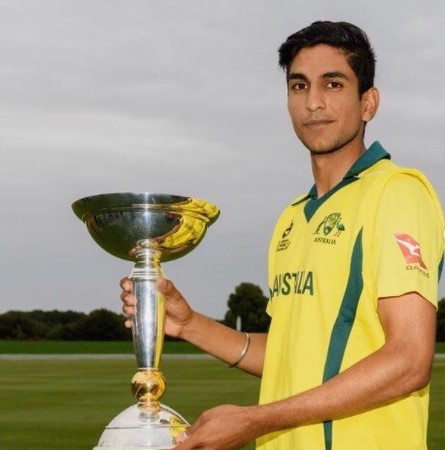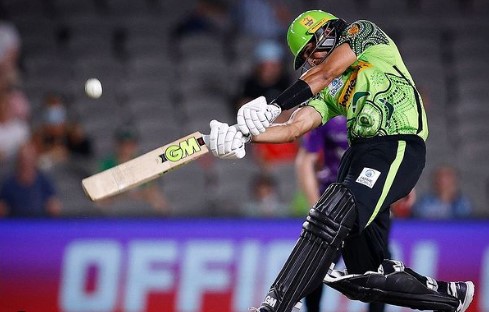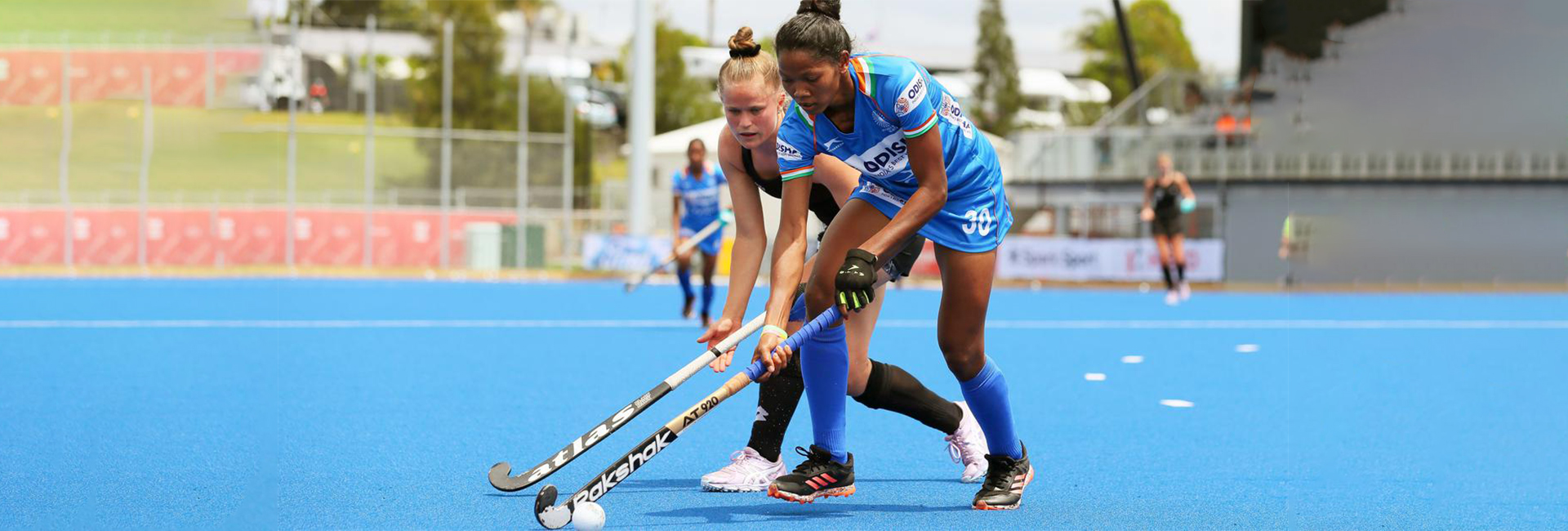(June 22, 2023) His dad was a cab driver, his mum managed to find work driving a bus. It was a time of hardship and great tenacity, as cricketer Jason Sangha’s family worked against the odds to create a life for themselves in Sydney, Australia. Despite their financial constraints, Jason was encouraged to follow his great love – cricket. In 2017, Jason Sangha made his first-class debut for Cricket Australia XI, in a pre-Ashes game. During his second match, he scored his maiden first-class century, becoming the youngest player to score a first-class century against England, second only to cricketing god, Sachin Tendulkar. In December 2017, he was named the Australian team captain for the 2018, U-19 Cricket World Cup, becoming tournament’s lead run-scorer, with 229 runs.
A right-handed batsman and right-arm leg break bowler, the Global Indian now plays for New South Wales and Randwick Petersham in the New South Wales Premier Grade Cricket. And Sangha was always gifted, standing head and shoulders above any crowd, learning to face the highs and lows that come with being exceptional. “If he was a thoroughbred, his breeding would be Joe Root out of Virat Kohli,” said Australian cricketer turned commentator Kerry O’Keeffe, who spotted Sangha’s genius early on and made sure he found a spot on the Australian test team. As for Sangha himself, he has been through far too much already, from battling mental health issues, financial hardship, dealing with the pressures of his chosen vocation and learning to belong in a place where he would always feel different, to be swayed too much by life’s highs and lows. “It’s a rollercoaster,” he often says. “Cricket is a rollercoaster.”

Jason Sangha
Jason Sangha’s story begins, not with the discovery of his own talent, but in Punjab with his father Kuldip, and in Sydney, where his mother Sylvia lived. His father, Jason writes, was the national 200m and 400m champion, who even competed at the Asian Games. However, sport being quite a political issue in rural Punjab, meant Kuldip’s talent lost out to those who held political sway. Kuldip and Sylvia had an arranged marriage, she flew down to Punjab to meet her husband and the couple went back to Sydney together. Kuldip left his athletic dreams behind and found work as a cabbie, while Sylvia was a bus driver.
“Money was always tight,” Sangha says. “What little was left over after living expenses was usually sent back to dad’s family in India. But they got by.” They gave birth to their first child, Sharon, in Rooty Hill Place, their first residence in Sydney, then went to Kemps Creek and finally, to Coogee, where Jason Sangha was born. They went on to set up their own restaurant, ‘The Flavour of North India’ and expanded to four outlets around Cronulla, Coogee and Maroubra.
“For as long as I can remember, we always had relatives staying with us, many from dad’s side of the family in India,” Sangha wrote in Athletics Voice back in 2017. As it is in an Indian home, the relatives pitched in, and the extended family formed deep bonds. He recalls his parents’ selflessness – “Mum always put others ahead of herself. She made sure everyone ate before she did. Dad was the same. The two of them would work long hours then, as soon as they got home, they’d set about making sure everyone else was alright.”
In those early days, Sangha wasn’t too interested in cricket, he preferred basketball, because of his hero, LeBron James. He liked the rugby league and soccer, “pretty much everything other than cricket.” When he was nine years old, he watched Adam ‘Gilly’ Gilchrist take Monty Panesar to the cleaners and feeling very impressed, enough to try his hand at the sport. As it happened, the family lived near the Coogee Oval, they could even see it from their apartment. So, the young Sangha would watch cricketers playing for Randwich-Petersham, and dream about being among them some day. And like so many other Indian kids, he would use a tennis ball to play cricket with his two cousins. He even remembers his neighbours in South Cardiff telling him he would play for NSW one day, as they watched his father bowl to him in backyard.
Just as things seemed to be picking up in the young boy’s life, the financial crisis hit, leaving the family in pieces. They were forced to sell and had no choice but to move to Newcastle to start over. “Mum and dad protectedus from the news. It wasn’t until three or four years later that I found out the real reason why we left Sydney,” Sangha recalled. As it turned out, Newcastle wasn’t so bad after all. Granted, Sangha was the “only brown person in school,” but had no trouble making friends. The city also had a small but thriving Sikh community, where Sangha learned to stay in touch with his cultural roots.
The whole 22 yards


By the time the family settled into Newcastle, Jason Sangha had established his love for cricket. He began playing junior cricket at Warners Bay in Cardiff and after one year, made it to the local team. He recalls his coach, Bob Holland, very fondly, saying, “he helped convert me from a quick bowler into a leg-spinner.” One year later, Sangha was 12 then, he moved up to grade cricket. This was an intimidating experience, “surrounded by all these grown men at Wallsend,” Sangha says. His peers stuck by him, though and he ended up playing the last two games of the season that year.
He was noticed by the first-grade captain, Brett Jackson, who became his batting coach. He was a hard taskmaster, though and Sangha definitely had moments when he wanted to give up, even telling his mother, “I don’t want to train with him anymore.” His mum simply told him to toughen up. The evening before the first game of the first-grade season, Jackson told him, “Also, I forgot to tell you: You’re playing.” Sangha was 13 years old, and had made himself known as something of a prodigy.
Jason Sangha was sixteen years old when he got his first contract with NWS. He got his contract, and with it, quite a bit of fame. The media was quick to point out that his was the youngest Blues’ signing since Josh Hazlewood.
The mental health descent
As has been the case with Sangha, life was unpredictable. What seemed like a rapid rise to success ended up being one of the most challenging years of his life, filled with mental health struggles, and the pressures of so much success at such a young age. “You’re not a normal 16-year-old kid anymore,” he would remind himself. “you’re a pro.” It was too much to take. His performance at school dropped because he was spending so much time away. Sangha even tried to give up school, although that idea was quicly shot down by his Indian parents. The situation got so bad that Sangha would wake up on game-day and think, “I’d be happy to nick off early and sit the rest out.” Although he scored a century in one game, the rest of his scores remained in the single digit. Suddenly, Sangha hated cricket.
His best friend, Joe Hart, and his family, rallied around him. His mum also moved the family back to Sydney, where she had set up a meeting for Sangha with Waverley College. So he and his mum set off for Sydney again. “We stuffed everythign we could into a car and headed to a flat in Belmore Road in Randwick,” Sangha writes.
Things weren’t easing up. Sangha’s schedule remained very intense – he would be in the gym at 6 am three days a week, finish training, come home for breakfast and get to school. After school, he would to the nets in Moore Park to practice, do his homework and go to bed. Everybody had high expectations of the precocious young man, and he struggled to cope.
View this post on Instagram
After he missed his sister’s wedding, things hit crisis point. His mentor and manager, Bill Anderson sat with him that day and told him to take a break. As always, his friends, family and peers stood by him. Eventually, Sangha was hit by another truth – “I have been so selfish,” he thought. “I haven’t even thought about the impact I’ve been having on other people around me.”
The turning point
The impact of Jason Sangha’s mental health struggles on his family inspired him to make a ch ange. He walked to the Sikh temple in Blacktown, something he hadn’t really done since moving back to Sydney. Through a series of small steps, he found his way out of the darkness, and also passed high school with flying colours.
In 2017, Sangha was chosen to captain Australia at the ICC Under-19 World Cup, along with Austin Waugh, son of former skipper Steve. He is also touted as one of Australia’s most promising young players and in 2022, was named captain of Sydney Thunder ahead of the Big Bash League. Unfortunately, Sangha broke his collarbone during the first game, leading to a big loss for the team, who were bowled out for a doube digit score by the Adelaide strikers.
Sangha’s story is one of perseverance and triumph over adversity. From humble beginnings in a financially constrained family, he embraced his passion for cricket against all odds. Battling mental health issues, balancing the pressures of success at a young age, and finding his place in a competitive sport, Jason Sangha has shown remarkable strength and determination. Through the highs and lows of his journey, he has emerged as a promising young cricketer, captaining Australia at the U-19 World Cup and earning recognition in the Big Bash League. And he has learned, the hard way that life is full of ups and downs and understands how to take both in his stride with hope and equanimity.
- Follow Jason Sangha on Instagram.




